|
|
|
Sort Order |
|
|
|
Items / Page
|
|
|
|
|
|
|
| Srl | Item |
| 1 |
ID:
085402
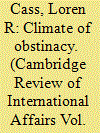

|
|
|
|
|
| Publication |
2008.
|
| Summary/Abstract |
Despite sharing a large number of attributes, Canada and Australia's foreign policy positions in international climate negotiations have varied significantly. Given the similarities in variables affecting climate policy, how do we explain the variation in foreign policy responses to climate change between the two countries? Rational choice and domestic political analyses have failed to fully explain the observed variation. National responses to climate change in Australia and Canada appear to be significantly shaped by ideational forces as well. In particular, political leaders have pursued symbolic climate policies to cultivate national identities for two distinct audiences-international partners and domestic voters. International climate policy positions have been frequently used as communication tools by both states with the resulting climate positions bearing little relationship to each government's domestic climate policies. The Australian and Canadian cases raise important questions regarding the relationship between foreign policy commitments and related domestic policy reforms, which have substantial implications for the effectiveness of global efforts to address climate change.
|
|
|
|
|
|
|
|
|
|
|
|
|
|
|
|
| 2 |
ID:
085485


|
|
|
| 3 |
ID:
085404
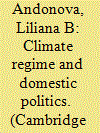

|
|
|
|
|
| Publication |
2008.
|
| Summary/Abstract |
The literature on climate cooperation focuses primarily on intergovernmental institutions and national policies. Few studies have examined the 'second image reversed' question: what is the impact of the international climate regime on domestic politics? This article examines the impact of the Kyoto Protocol on climate politics in Russia. Russia is an important case study both from a theoretical and policy perspective. Analytically, the case provides an opportunity to assess alternative theories of regime impact, given Russia's early scepticism about climate change and insistence on unrestrained economic growth. The study finds that the Kyoto Protocol influenced political interests in Russia first and foremost through the redistribution of resources and potential payoffs, but also through more subtle mechanisms such as capacity building and the diffusion of economic assessments. The result was a realignment of powerful domestic interests in a direction that has supported the main institutions of the climate regime and pushed for its implementation. Documenting the domestic political impacts of the Kyoto Protocol has policy implications for the conditions under which Russia and other large emerging markets focused on growth might undertake obligations to strengthen climate cooperation.
|
|
|
|
|
|
|
|
|
|
|
|
|
|
|
|
| 4 |
ID:
085406


|
|
|
|
|
| Publication |
2008.
|
| Summary/Abstract |
This article investigates how transnational NGO cooperation can influence the official Chinese stance on climate change politics. Drawing on the constructivist approach to international relations, the so-called 'spiral model', developed by Risse et al (1999) for the human rights field, is applied to environmental politics for the first time. The model is tested by process tracing the historical development of the Chinese position on climate change and by analysing the roles and impacts of different actors in different phases of norm internalization. The model is complemented by an in-depth analysis of present transnational NGO campaigns in China. Although results show that international and Chinese NGOs have an influence on Chinese climate politics, the model's assumption about the causes for a norm internalization could only partly be confirmed: instead of the pressurizing strategies of the transnational advocacy network, instruments of sharing information seem to be more effective in changing Chinese climate politics.
|
|
|
|
|
|
|
|
|
|
|
|
|
|
|
|
| 5 |
ID:
085418
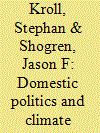

|
|
|
|
|
| Publication |
2008.
|
| Summary/Abstract |
We use the theory of two-level games to explore how domestic constraints affect the outcome of bargaining games over national contributions to an international public good such as global climate change, and to discuss the implications for the Schelling conjecture. We model the international negotiations on two dimensions-domestic and foreign contributions to the international public good-and extend the basic two-level model by examining a nonzero sum, two-dimensional conflict model on level one that includes characteristics of both conflict and cooperation. Our main results suggest that if the domestic game is a ratification game (as in the presidential system of the US), then contributions do not exceed those in a benchmark game without domestic constraints. But if the domestic game is an election game (which is more important in the parliamentary system of most continental-European countries), contributions can actually be higher than the benchmark.
|
|
|
|
|
|
|
|
|
|
|
|
|
|
|
|
| 6 |
ID:
085421


|
|
|
|
|
| Publication |
2008.
|
| Summary/Abstract |
This article analyses the emerging discourse on 'climate security' and investigates whether and how attempts to consider environmental problems as security issues are transforming security practices. Attempts to broaden the security agenda have been deemed as spreading the confrontational logic of security-which, within international relations, is traditionally associated with the exceptional decision that brings into existence the logic of war-into sectors from which it had been excluded. This problematic development has been described as 'securitization'. This article argues that this perspective does not consider whether and how by securitizing nontraditional sectors, alternative security logics are evoked and practices associated with securitization are challenged and transformed. The securitization of the environment, it is argued, is transforming existing security practices and provisions. This process is part of broader re-articulation of the spaces in which a logic of security based on emergency and contingency is legitimated and those in which a logic of prevention and management prevails. It implies new roles for security actors and different means to provide security.
|
|
|
|
|
|
|
|
|
|
|
|
|
|
|
|
| 7 |
ID:
085484


|
|
|
| 8 |
ID:
085442


|
|
|
|
|
| Publication |
2008.
|
| Summary/Abstract |
The assignment of obligations to pay for mitigation of greenhouse gas emissions and for adaptation to unavoidable climate change is a critical and controversial component of international negotiations under the United Nations Framework Convention on Climate Change. In this article we present a new framework called 'Greenhouse Development Rights' (GDRs): a formula for the calculation of national obligations on the basis of quantified capacity (wealth) and responsibility (contribution to climate change). GDRs seek to preserve the 'right to development' by exempting from obligation any income and emissions under a 'development threshold'. By taking into account the distribution of income and emissions within countries, and calculating national obligations as if they were the aggregated obligations of individuals, the framework treats every global citizen identically, and allocates obligations even to poor countries that are proportional to their actual middle-class and wealthy populations. When coupled to a trajectory of rapid emissions reductions (for example, 80 per cent reduction below 1990 levels by 2050), the framework results in larger reduction obligations for both rich and poor countries than they currently seem prepared to accept. However, the formula may be 'fair enough' to break the impasse that currently separates rich and poor countries in the negotiations.
|
|
|
|
|
|
|
|
|
|
|
|
|
|
|
|
| 9 |
ID:
085440
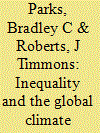

|
|
|
|
|
| Publication |
2008.
|
| Summary/Abstract |
This article explores the hypothesis that global inequality may be a central impediment to interstate cooperation on climate change policy. Conventional wisdom suggests that outcomes in international environmental politics are primarily attributable to material self-interest, bargaining power, coercion, domestic environmental values, exogenous shocks and crises, the existence of salient policy solutions, the strength of political leadership and the influence of nonstate actors. Yet none of these approaches offers a completely satisfactory explanation for the long-standing north-south divide on climate change. Drawing on social inequality literature and international relations theory, we argue that inequality dampens cooperative efforts by reinforcing 'structuralist' world-views and causal beliefs, polarizing policy preferences, promoting particularistic notions of fairness, generating divergent and unstable expectations about future behaviour, eroding conditions of mutual trust and creating incentives for zero-sum and negative-sum behaviour. In effect, inequality undermines the establishment of mutually acceptable 'rules of the game' which could mitigate these obstacles.
|
|
|
|
|
|
|
|
|
|
|
|
|
|
|
|
| 10 |
ID:
085409
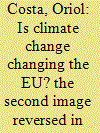

|
|
|
|
|
| Publication |
2008.
|
| Summary/Abstract |
The participation of the European Union (EU) in the international negotiations on climate change has attracted a significant share of scholarly attention. Climate change has certainly become a new dimension of European foreign policy and has enabled the EU to play a leadership role in the international arena. However, the relationship between the EU and the international climate regime is not a one-way street-while the EU has been active and decisive in shaping international negotiations, the latter have also had an impact on the EU. The international negotiations have influenced the EU's decision-making processes and internal negotiations-which has in turn influenced European integration itself. This article builds on the arguments of second image reversed analyses and proposes that there is a reciprocal relation between certain conditions of the EU-domestic setting and the international climate regime. The internal arrangements of the EU regarding climate change have maximized the influence of the regime and the very existence of the international negotiations has moulded these arrangements, making them more prone to external influence.
|
|
|
|
|
|
|
|
|
|
|
|
|
|
|
|
| 11 |
ID:
085412
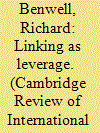

|
|
|
|
|
| Publication |
2008.
|
| Summary/Abstract |
Seven years after the United States rejected binding emissions limitations and George Bush declared the Kyoto Protocol dead, there are signs of change. There is growing interest in emissions trading at the regional, national and substate level, and in the prospect of linking schemes together. This article suggests that the rapid growth of emissions trading markets themselves may be helping to swing the cost-benefit analysis of participation in emissions reduction commitments for American actors and others. Most simply, the practical viability of international emissions trading has now been confirmed, largely by the European market, but there are two further elements to this development for which this article presents the early evidence. Firstly, unanticipated benefits appear to be accruing in the established compliance markets. Secondly, ownership of the emerging markets can bring new bargaining power to encourage others to adopt meaningful climate targets.
|
|
|
|
|
|
|
|
|
|
|
|
|
|
|
|
| 12 |
ID:
085423
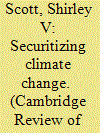

|
|
|
|
|
| Publication |
2008.
|
| Summary/Abstract |
On 17 April 2007 the United Nations Security Council held its first debate on climate change, energy and security. Since then, and despite a number of reports emphasizing the security implications of climate change, there has, at least in diplomatic circles, been a move away from the previous trend towards accepting climate change as a question of international security. This is primarily due to the possibility of the Security Council taking the lead in coordinating global efforts to mitigate, or adapt to, climate change. Developing countries interpret this possibility as a rejection of the principle of common but differentiated responsibilities as incorporated into the United Nations Framework Convention on Climate Change. The increasing urgency of taking decisive action means that it is too early to rule out a role for the Council with its coercive powers. Ultimately, however, the success of any international regulations will depend on their political legitimacy.
|
|
|
|
|
|
|
|
|
|
|
|
|
|
|
|
|
|
|
|
|